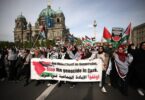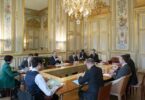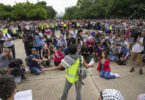Mohamed Chebaro
With all the clouds of instability, war and direct and indirect escalatory confrontations gathering above the Middle East, Saturday’s 49th anniversary of the outbreak of Lebanon’s civil war passed unnoticed. This is despite the country’s permanent precariousness, which puts it at the mercy of any winds or storms, whether they blow domestically or are linked to the Palestinian crisis, the Syrian crisis or any crisis linked to the agenda of the so-called axis of resistance formed and controlled by Iran.
Two killings last week could summarize this precariousness, ironically falling as they did just days before the anniversary of the start of Lebanon’s bloody civil war – April 13, 1975 – which all Lebanese would wish to forget. What these events point to is that Lebanon as a state continues to teeter on the brink. And many of its people, the regional powers and international community have long since resigned themselves to accepting its status: as a nation often just a step away from becoming a failed state.
But nobody should make the mistake of ignoring this small, perennially teetering country, as its complete collapse would no doubt reverberate and impact its immediate neighbors, as well as many other countries, such as those on the European shores of the Mediterranean, should droves of Syrian, Palestinians and dispossessed Lebanese decide to take matters into their own hands and seek a better life elsewhere. They could even be pushed into doing so by malicious actors, with weaponized migration waves, as witnessed elsewhere in the world, aiming to disrupt and pressure Western nations.
One day before the anniversary, thousands of Lebanese gathered in the Christian heartland of the north to mourn a Christian political official who was slain earlier in the week. The authorities said he was killed by a Syrian gang in a carjacking incident, but many were not convinced by this official version of events. Although Hezbollah’s chief denied that his party had anything to do with the killing, the Lebanese Forces – the party to which the slain Christian leader belonged – said that it considered his death a “political assassination until proven otherwise.” It blamed his death on the Lebanese state’s failure and “illegal weapons,” a veiled reference to Hezbollah.
Iran-backed Hezbollah is the only party in Lebanon that has kept its weapons arsenal since the end of the 1975-1990 civil war and the implementation of the Taif Agreement brokered by Saudi Arabia. Through Syrian and Iranian-backed political and violent maneuvering, Hezbollah gradually became the party that wielded the most influence over the country’s political, social and economic life. And since Israel’s war on Gaza began on Oct. 7, Hezbollah has traded near-daily cross-border fire with Israeli forces – actions opposed by the majority of Lebanese, especially the Lebanese Forces.
Also last week, a Lebanese man under US sanctions for allegedly funneling money from Iran to Hamas was killed just outside Beirut. The slain man, Mohammed Sarur, served as a middleman between the Quds Force and Hamas and had worked with Hezbollah operatives to ensure funds were provided to Hamas’ armed wing, according to the US Treasury Department. Lebanese security sources stated that Sarur was shot five times and an undisclosed sum of cash was found in his possession, which the killers did not touch. These two events, though different in nature, were both broad daylight assassinations and were not the work of petty criminals, whether from Syria or elsewhere. They point to the complex security landscape in Lebanon and the fact that such incidents could tip the country toward renewed communal strife.
Attention is needed so that things do not become even worse in the country, if such a thing is still possible. Lebanon has been without an elected president for a year and a half. Its caretaker government is next to idle, as it does not have the will, the funds or the constitutional mandate to take reformist steps, which are seen as essential to receiving an International Monetary Fund lifeline, as its discredited political elite fail to put in the work needed to rescue the country’s future.
Since October 2019, Lebanon’s banking system has been marginalized after it used people’s deposits to fund its day-to-day financing. Capital control was applied to depositors to prevent the banking institutions from going bankrupt. The national currency, meanwhile, has lost nearly 90 percent of its value. One of the world’s largest explosions hit Beirut port in 2020 and the culprits remain at large, amid a divided, politicized judicial system that was once independent. And as 80 percent of Lebanese find themselves living below the poverty line, as per World Bank figures, the country’s services are starved and close to caving under the pressure of close to a million registered Syrian refugees and more than half a million long-term Palestinian refugees.
And as if all that were not enough, visitors to Lebanon could hardly fail to notice the great void on the political and security levels while, to a great extent, the country’s internal security enjoys a bizarre stability that is difficult to fathom. Last week’s incidents were most probably political and remain an anomaly. But what lurks beneath the surface are adversities that could befall the nation if no remedies are urgently found.
Nearly 50 years since the civil war broke out, communal coexistence in Lebanon remains fragile and could be malignantly invested into. Previously, it was the Palestinian presence that irked sections of Lebanese society, nowadays it is the presence of Syrians, refugees and non-refugees alike. Who knows, tomorrow an extremist group might invest in the many fertile grounds for discord that exist among Lebanon’s despairing communities.
Since the start of the Gaza war six months ago, the Lebanese have been wondering whether this neighboring conflict will engulf the south of the country. The fear remains that Lebanese divisions could also create many scenarios that might tip the fragile peace and stability of the country over the edge, such as was witnessed last week.
Arab News







